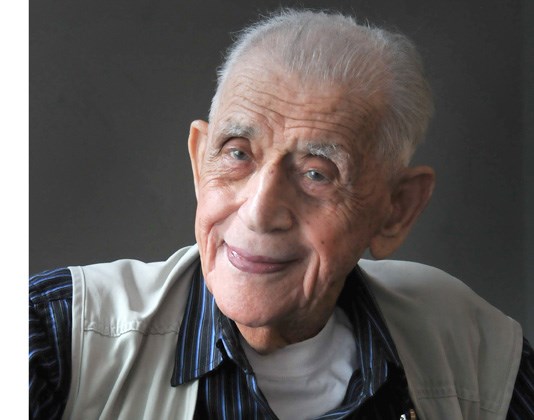After finally overcoming delays, the Allied forces were ready to launch what would go down as the largest seaborne invasion in history on June 6, 1944.
The Canadian troops landed on the sands of the code-named Juno Beach in Nazi-occupied Normandy, France. Facing staunch resistance from the Nazi forces, the Allies claimed a decisive victory in which 359 died, 574 were wounded and 47 soldiers were captured.
Fewer voices are around to tell the tale of fractured mortar shells, bullets and corpses that blanketed the beaches on D-Day.
North Vancouver resident Frank Zantoas is one of the roughly 90,000 Second World War veterans left of the million who served in Canada's Armed Forces.
Zantoas, 90, says he still remembers D-Day like it happened yesterday and not 70 years ago.
"It was quite a day," he said. "It's something you just can't imagine, the way things happened, being such a small part of it."
Zantoas recalls feeling excited and worried about approaching the shore at the break of dawn on D-Day, but he "didn't have time to feel sorry" for himself because the task at hand overwhelmed his senses.
"All around, there was combat," he said. "It was deafening. And the Germans with the mortar shells, they made this terrible noise day and night. And then these flash bombs would light up whole areas like you're in downtown New York."
Zantoas enlisted in the Canadian military at 19 in 1942. He served in the Provost Corps, which is the military police corps. His duties included traffic control and directing tanks while riding along with them on his motorcycle. Of his unit, Zantoas is the only one living.
"I'm kind of glad it's over," he added, about serving in the war. "I (miss) the comradeship you go through, especially when you were there, everyone was a part of it. We're all getting bombed. But I remember the children getting taken out of their homes and moved places. It was quite sad, really."
As Zantoas's job was to keep the roads clear for tanks and infantry, he also remembers having to move civilians off the road.
"It was too bad for the families," he added. "We couldn't have them on the roads with horses and wagons, with the tanks. We had to kick them off. Here they were, they had no place to go. It was always late to get help for those people."
While the veteran's memories are inundated with the horrors of war, Zantoas said he focuses on the good times, too, despite being few and far between in battle.
"The things I remember around that time are the good days," he said. "We had these rest periods and we're all out having mobile showers and all the women were lined up watching us shower, waving at us."
The 90-year-old's quick wit and charm haven't changed over the years, he noted, and recalled one of his favourite pastimes during the intense training they received for the Provost Corps in England.
"We were always stealing each other's girlfriends," he said. "The men are all great dart players there, ya know. But I never learned to play darts. These guys are at the pubs, they're shooting, and all these beautiful girls would be sitting there by themselves. So, I joined the women. I never learned to play darts."
Although he remembers the fun times during training, it wasn't quite the same when they trained for D-Day in northern Scotland.
"We're wading in this ice cold water, all this kind of stuff," he said. "We had to learn how to drive different types of vehicles. It was quite an experience."
After surviving D-Day, Zantoas was involved in another major battle when the Allies pushed the German army back towards Falaise in Normandy. A mortar shell blindsided him while he was riding his motorcycle and he woke up in an aid station.
"Anywhere all this stuff would break out and you didn't know where or why," he added. "The Germans had a big breakout and we had them surrounded and they just broke out and it was pretty dangerous all around there for awhile."
Two months later, Zantoas was back on the field. He was in Holland when the war was declared over.
Zantoas has received many honours commemorating his service in the Second World War, including the 1939 to 1945 Star, the Italy Star, the France and Germany Star, the Defence Medal.
After all these years, the North Vancouver veteran says he'll never forget.
"Some things remind me of it," he said. "I learned to put stuff out of my mind as quickly as I can, and you can't live with it being there, but little things will remind me of it.
"If I see a grown man crying at a funeral, I see the guys there crying - little things like that come back to me."



